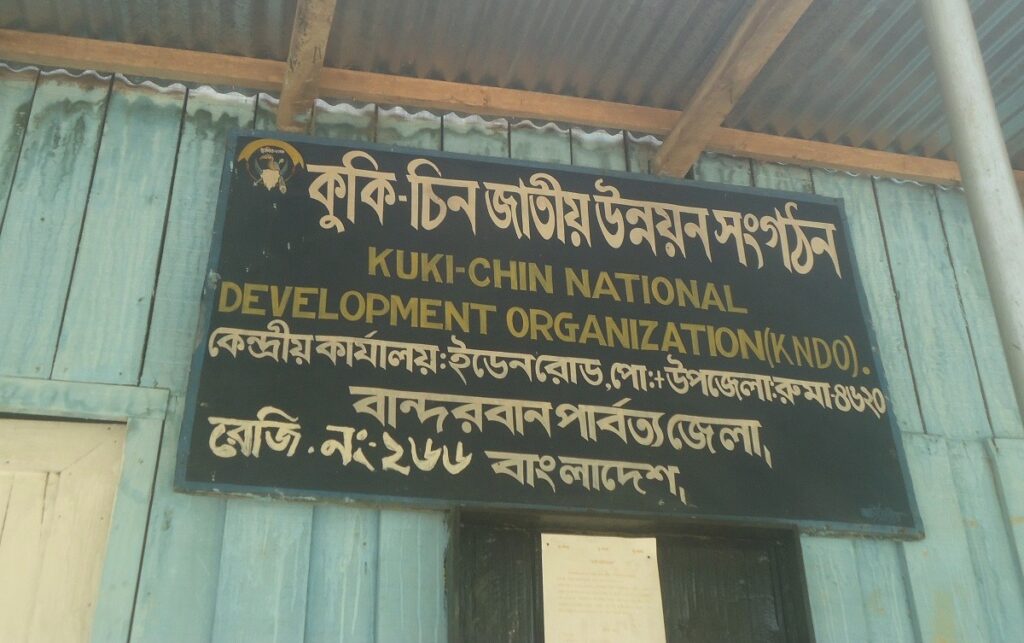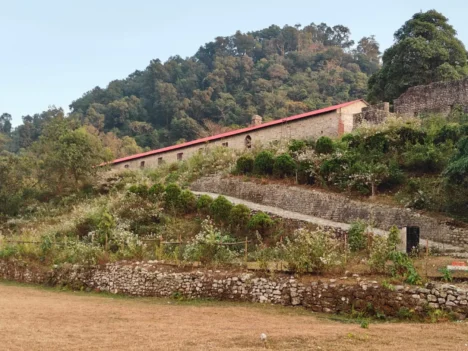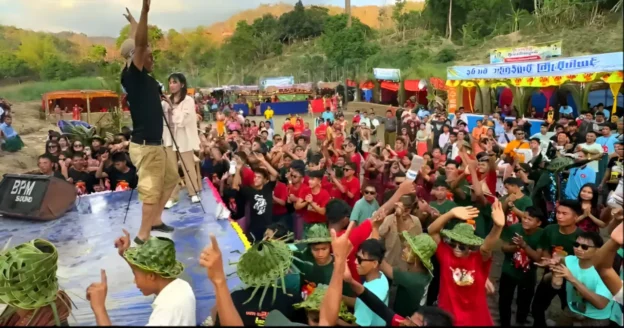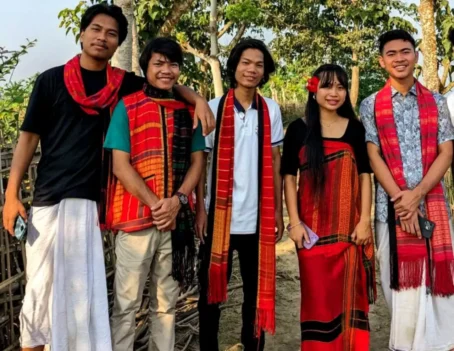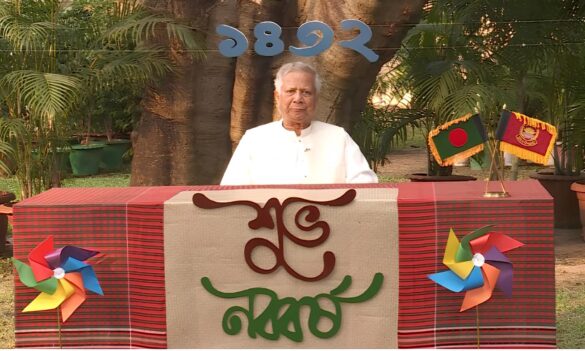People in Bangladesh’s southeast hill region remain panic-stricken following attacks on three branches of two banks in two sub districts of Chittagong Hill Tracts (CHT) of Bangladesh within 17 hours by The Kuki-Chin National Front (KNF) recently.
Yet, two and a half decades later of CHT Accord, peace remains elusive and violent armed conflicts routinely ravage the lives of indigenous people.
Before settling on its current iteration, the Kuki-Chin National Front (KNF) in 2021, one Nathan Bawm founded Kuki-Chin National Development Organization (KNDO) in 2008 while in 2017, KNDO was changed as Kuki-Chin National Volunteers (KNV).
In 2012, Md Syeed Siddiki, former Brigade commander of Bandarban region attended a programme at KNDO office with Ruma Zone Commander Lt. Col. Ariful Bari and Captain Nahid, local sources said.
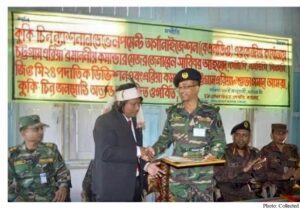
In 2015, General Officer Commanding (GOC) of the 24th Infantry Division also attended a programme of KNDO with former Bandarban Region Commander Brigadier Md. Naqib Ahmed Chowdhury.
In 2017, around 22 members of KNV went to Chin state of Myanmar for military training with the help of some top officials of local security forces, said a senior journalist from Bandarban.
On December 30, 2021, KNF in a Facebook post announced that “the Chittagong Hill Tracts is not a Jummaland, it is a Kuki-Chin territory.”
“The Chittagong Hill Tracts Peace Accord and the Regional Council is not for the Kuki-Chin people, it is just a Chakma agreement and a development council for the Chakma people”, the post reads.
On June 21 of 2022, KNF attacked Saijam Para village of Rainkhyong valley under Bilaichari upazila of Rangamati and killed 3 villagers brutally with four injuries including two children. The victims are all from Tripura community.
The army started a joint drive in Ruma Upazila of Bandarban and in Bortholi union of Bilaichari upazila of Rangamati from October 3, 2022.
On October 6 of the same year, Rapid Action Battalion, an elite force of Bangladesh disclosed at a press conference that the militants of Jamatul Ansar Fil Hindal Sharqiya were receiving training at KNF camps in CHT in exchange of money.
On October 9, 2022, the security force helped Nathan Bawm and the militant leader Shamim Mahfuz to escape from the KNF camp at remote Ramettaung hill, said a local journalist seeking anonymity.
In 2020, KNF and Jamayat-e-Arakan had an agreement with the help of security force. In the agreement KNF wants to set a camp in Parva of India’s Mizoram and Jamayat-e-Arakan camp at tri-junction area (Indo-Bangladesh-Myanmar border) while arms and ammunition from Myanmar for militants and KNF will be delivered by them in exchange of money, said an indigenous leader from Bandarban.
Soon after its formation, KNF launched a campaign of communal provocation against the CHT Peace Accord and Parbatya Chattagram Jana Samhati Samiti (PCJSS) and also against the Chakma community.
In the early hours of April 6, 2023, state-sponsored vigilante groups kidnapped 22 villagers of Bawm community from remote Jurbharang Para of Paindu Union under Ruma upazila of CHT. After keeping them hostages at a local school, the vigilante group executed eight Bawm villagers and released the rest, said an indigenous leader of Bandarban.
Humanity Protection Forum, a human rights organization based in Tripura of India, in a press statement also claimed the same.
Nathan Bawm’s elder brother was arrested by a group of RAB-15 from his house in Ruma on October 13. He was a cashier in Ruma branch of Sonali Bank.
KNF has carried out at least ten terrorist incidents in the past two years while five army personnel were killed in four attacks by KNF terrorists last year, said a top police official of Bandarban.
“Bawm community people living in CHT are in dire situation for KNF’s terrorism while around 2000 people from Bawm community took shelter as refugees in Mizoram following the combing operation in last year” said, Laljarlom Bawm, a Bawm community leader.
“Nathan said they have around 800 armed members when I have contacted with him earlier”, said Laljarlom.
“Nathan wanted to contest the 2018 parliamentary elections but it ultimately came to no avail as his nomination was cancelled”, he said.
Just before the 11th parliamentary elections in Bangladesh, some Awami League leaders including Kwe Shwe Hla, chairman of Bandarban Hill District Council (BHDC) assisted by the security force formed the Mogh Party to ruin harmony in the region.
During the past caretaker rule in 2007-08 PCJSSfaction group was formed in the same policy of divide and rule in CHT.
On November 15, 2017, UPDF faction announced its separation from UPDF main at a press conference in Khagrachhari hill district which was also the same policy of state mechanism.
Ever since Bangladesh gained independence in 1971, the government has failed to recognize the human rights of indigenous people or their rights to ancestral lands.
The CHT Accord signed in 1997 is supposed to have ended the decades-long fierce armed conflict between the indigenous people and the government.
The Accord was hailed and welcomed not only by the indigenous and democratic and progressive political parties of Bangladesh, but also by the United Nations, European Union, and many other democratic governments of the world.
The peace accord guaranteed the rights of indigenous peoples to their ancestral lands in CHT. Yet today, 26 years later, indigenous people continue to be forcibly evicted from their ancestral land.
Under peace accord, the Bangladesh government committed to military withdrawals and transfer of authority to representative Hill District Councils, including over local police, land management, and environmental protection.
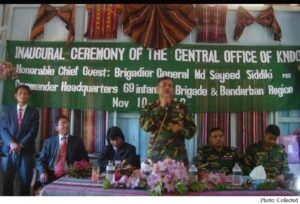
The peace agreement has never been fully carried out. Nearly 26 years later, much of the region remains under military occupation, and most of the commitments laid out in the accord have yet to be realized. Instead, indigenous rights groups in CHT say that the military presence has increased in recent years.
CHT, a hilly region of over 5,000 square miles, lies in the southeastern corner of Bangladesh bordering the Indian states of Tripura and Mizoram to the north, and Myanmar to the east.
Massive and systematic human rights violations against the indigenous people have been committed by Bangladeshi security forces and armed mobs of settlers.
“KNF was created in ‘divide and rule’ policy to keep CHT unrest by an interest group of state who creates hindrance to implement the historical peace accord”, said Gautam Dewan, president of CHT Citizens Committee.
After several attempts, General Officer Commanding (GOC) of the 24th Infantry Division could not be reached.
The security force has played a decisive role in Bangladesh. Its influence over political, economic and social affairs is particularly pronounced in the CHT, a region of natural abundance and home to 11 indigenous groups of approximately 700,000 people experienced with decades of relentless human rights violations.

